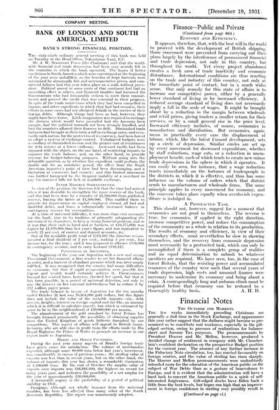Finance—Public and Private
(Continued from page 864.)
ECONOMY AND EFFICIENCY.
It appears, therefore, that, with the best will in the world to proceed with the development of British shipping, those concerned were prevented from carrying out their plans largely by the interference of pronounced financial and trade depression, not only in this country, but throughout the world. Yet every project abandoned creates a fresh area of trade inactivity and economic disturbance. International conditions are thus reacting on the trade and industry of this country, not only at the immediate point of contact, but in a much wider sense. Our only remedy for this state of affairs is to increase our competitive power, either by a generally lower standard of living or by increased efficiency. A reduced average standard of living does not necessarily imply a fall in the scale of wages. It might be brought about by a reduction in the margin between wholesale and retail. prices, giving traders. a smaller return for their services, or by a small general rise in the price level. Increased efficiency includes, of course, economies in manufacture and distribution. But economies, again, mean in practically every case the displacement of labour, which, like the latest Cunard development, sets U p a circle of depression. Similar circles arc set up by every movement for decreased expenditure, whether by staff reductions, wage cuts, or a reduction in unem- ployment benefit, each of which tends to create new minor trade depressions in the sphere in which it operates. It can easily be seen, for instance, that a wage reduction reacts immediately on the fortunes of tradespeople in the districts in which it is effective, and . thus has some influence on the volume of orders which that district sends to manufacturers and wholesale firms. The same principle applies to every movement for economy, and the converse takes place equally when overlavish expen- diture is indulged in.


































 Previous page
Previous page